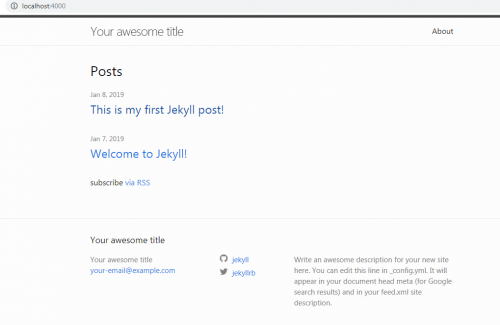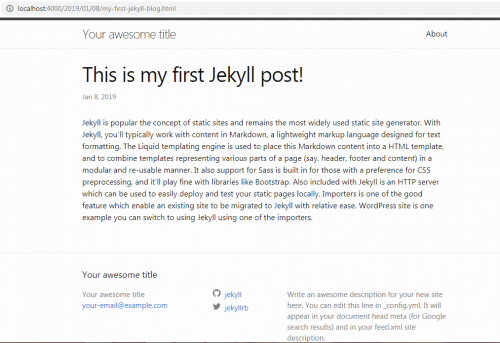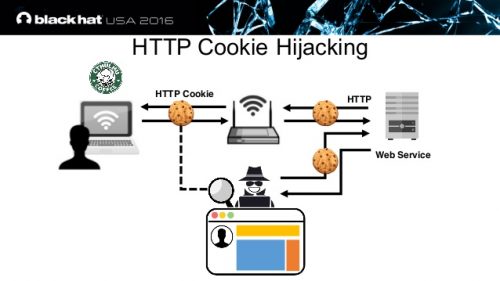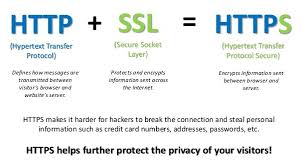by Mark | Mar 15, 2019 | Industry News, State of the Web
30 years ago this week (March 11, 1989), Tim Berners-Lee submitted his proposal for an information management system. A lot has happened since that initial proposal. Without a doubt, the WWW has had a significant impact on our society. Personally, I have been learning about web technologies since 1992 (27 years). I am amazed at the scope and scale of changes I have witnessed in nearly three decades. Our organization was founded in 1997 (this April will mark 22 years for us). And, we have witnessed profound changes over that time as well.
Renew our focus on core principles
In the past 30 years, the WWW has morphed into what we know today. There are growing divides and these have been discussed in the open letter written by Sir Tim Berners-Lee on March 11, 2019.
We believe it is time for governments, companies, and citizens to formally commit to the principles outlined in the Contract for the Web. The key points outlined in this contract are cited in the bullet points below:
- Governments should:
- provide access to the web and Internet for everyone,
- make certain the web and Internet is available all the time and all content is available,
- recognize and respect the fundamental right to each individual’s privacy.
- Companies should:
- keep the web and Internet access affordable and accessible to everyone,
- respect the fundamental right to each individual’s privacy (and personal data),
- support technologies which put people first.
- Citizens should:
- create content and collaborate,
- foster strong communities where everyone feels safe and welcome,
- do their part to keep the web open and public.
We signed, did you?
As a member supported organization helping aspiring and practicing web professionals, we have always adhered to the core principles discussed in the above letter. We have signed the Contract for the Web to reaffirm our commitment. We signed as an organization and we encourage members and others reading this to sign as well.
The WWW has created many opportunities and we are at a key point in the evolution of this medium. As an organization, we support continued efforts to create the web we want. We encourage all to do their part.
Best always,
Mark DuBois
Executive Director and Community Evangelist

by Mark | Feb 8, 2019 | Industry News, Sponsored Content
Technology has impacted our lives on a larger scale, including our health. From doctors to patients, everyone has adopted the digitization of health industry. And this adoption has given rise to healthcare mobile app development. Undoubtedly, the demand for mobile apps in the healthcare sector is constantly increasing. Medical apps or mhealth apps have brought revolution in the way patients receive care and how patients communicate with providers.

Healthcare mobile apps made patients empowered to take their own, fully-informed medical decisions. It not only provides them with more knowledge but also increases patients’ involvement. Whether it is the healthcare provider or patient, mhealth app developers took the initiative to level the playing field for everyone.
Let’s have a look at how mhealth apps are transforming the healthcare industry.
With the help of mhealth apps, healthcare providers can cater to medical emergencies as well as offer enhance patient care. These apps are slowly becoming a significant part of the patient-provider lifestyle. It comes handy in a lot of medical procedures such as viewing blood reports and medical prescriptions, tracking patient recovery, and monitoring disease symptoms. Digital prescriptions allow providers to treat and monitor patients on the go.
Benefits of Healthcare Mobile Apps
Some of the biggest concerns of patients while accessing healthcare services are the cost of medical and health insurance and keeping pace with the technology. Healthcare mobile app development addresses these concerns and improves patient-provider communication. Even though health is a priority for everyone, but visiting hospitals frequently for regular checkups or follow-ups doesn’t count as a feasible option. Mobile technology brought relief to this problem. Here are some of the benefits of healthcare mobile apps:
- Easy care access: mhealth apps let providers communicate with the patients in a better way. It reduces the distance between them and improves the patient-provider relationship. Mobile apps let patients take consultation over platforms and visit only as recommended. This will not only save patients and providers’ time but also cut a significant cost.
- Improved patient engagement: The long queues outside the doctors’ clinic leaves a very limited time for providers to treat every patient warmly. In addition to this, it lacks the transparency of cost and quality. Healthcare apps work the best for patients, as it informs them if there is any delay in the appointment or they want to fix an appointment in the real time.

Additionally, mhealth apps are beneficial for working professionals and elderly who don’t get updates regarding upcoming doctor appointments or pill schedule. These apps work as an assistant for patients, reminding them to take pills and scheduled appointments as required.
- No More Medical Fraud: With healthcare apps, there would be no more Medicare fraud. Often, patients get mislead by brokers present in the hospital who fool them saying that they will fix their appointment and charge a hefty amount to the medical staff. mhealth apps let patients access healthcare services without any mediator. Additionally, patients are also able to book their appointments directly with the doctor through the app and get genuine bills.
- Round the clock service: Healthcare mobile apps offers 24*7 assistance to patients and providers. Generally, when patients are done with consultations, they are left with paper, prescribed medicines, and recommended treatment. This way, there are higher chances that patients may miss the key points mentioned by doctors during treatment.
In such situations, healthcare apps come as a handy solution. It can help patients remember even the minute detail and the important instructions from providers such as taking pills, checking side effects, and contacting a doctor immediately in case of emergency.
Role of mobile apps in the Healthcare Sector
When it comes to healthcare, it becomes mandatory for healthcare providers to make quick decisions and implement those decisions timely to save patients’ lives. An efficient IT infrastructure is necessary for the providers to make prompt decisions. Here healthcare mobile apps can ease-down the decision-making process.
Mobile technology has proven helpful for doctors and nurses. It enables them to check patients’ health records in the real-time and patients can monitor their health conditions too. It also helps policy-makers to further improve as well as create new healthcare programs.
Here are some tips to develop a Successful Healthcare Mobile App

- Determine your target audience: Determining who you are going to provide your services is one of the most crucial factors to consider while developing a healthcare app. Explore as much as you can on your targeted user-base.
- Understand the need/problem: Once you know your target audience, determine what problems they are facing and how can you solve it. There might be many apps available in the market that claim to solve the same problem but hardly people find those appropriate. As a healthcare app developer, you must provide a solution that offers an easy-to-use experience to your users and solves their problems efficiently.
- Customize as required: Your solution should be customized as per patients’ needs. It should provide information to the users, specific to their queries and with which they can relate to.
- Direct Communication: Your healthcare app should offer a direct communication medium between patients and their doctors as it helps patients understand their health state. The medium can be in any form: messages or email.
Earlier, it was necessary for the patients and doctors to be in the same place for the treatment. With the advent of healthcare mobile apps, this limiting requirement has been addressed and solved as patients can take consultation, book appointments and tests, and take proper follow-up virtually within the app. These apps are like a blessing for the people living in rural areas and face difficulty in connecting with professional doctors.
Key Take Away!
As you have learned about how the intervention of technology with healthcare gave rise to healthcare mobile apps, its benefits, and a few tips to build a successful healthcare mobile app. It is evident from the above discussion that the upcoming years are going to be great for the healthcare providers and patients as there will be better solutions and many options to choose from, in order to solve a problem.
Whether it is a patient or a healthcare provider, there are numerous advantages for everyone. If you are thinking about developing your own app then it’s the right time to do it. All you need is a skilled team of an experienced digital healthcare technology partner, medical app developers, and digital marketers.
Editor’s note. This sponsored content was provided by Ritesh Patil.

Ritesh Patil is the co-founder of Mobisoft Infotech that helps startups and enterprises in mobile technology. He loves technology, especially mobile technology. He’s an avid blogger and writes on mobile application. He works in a leading mobile app development company with skilled Android and iOS app developers that has developed innovative mobile applications across various fields such as Finance, Insurance, Health, Entertainment, Productivity, Social Causes, Education and many more and has bagged numerous awards for the same. You can find him on Twitter and LinkedIn.

by Harshala | Feb 1, 2019 | Content Management Systems, Content Strategy, Industry News, Web Content, Web Design, Web Development
We covered the fundamentals of static site generators recently. Let’s take a deeper dive into one of them.
Jekyll
Jekyll remains the most widely used static site generator. With Jekyll, you’ll typically work with content in Markdown, a lightweight markup language designed for text formatting. The Liquid templating engine is used to place this Markdown content into the HTML template, and to combine templates representing various parts of a page (say, header, footer and content) in a modular and re-usable manner. It also has support for Sass for those with a preference for CSS pre-processing, and it’ll play fine with libraries like Bootstrap. Also included with Jekyll is an HTTP server which can be used to easily deploy and test your static pages locally.
Importers is a feature which enable an existing site to be migrated to Jekyll with relative ease. For example, you can take an existing WordPress site as a starting point with Jekyll using one of the importers.
If you have a GitHub repository, you’re able to create a GitHub pages site for free using Jekyll. This can be a convenient way to give a polished landing page to your GitHub project.
The big downside of Jekyll – and this applies to most generators – is that it can seem complex at first and is a new technology to master.
If you want to try it yourself, here is the link to install Jekyll.
Installation of Jekyll
You first need to install the Ruby DevKit or you will experience errors. If you are installing Ruby only for the purpose of running Jekyll, Portable Jekyll will give you a full working Jekyll install in less than 5 minutes.
Few easy steps:
To set up your site locally with Jekyll, follow these steps:
- Create a local repository for your Jekyll site.
- Install Jekyll using Bundler.
- (optional): Generate Jekyll site files.
- Build your local Jekyll site.
- Keep your site up to date with the GitHub Pages gem.
- Configure Jekyll.
Does Jekyll generate valid HTML?
Jekyll essentially a parser that converts plain text content written in a special formatting language called Markdown into HTML. These content blocks get inserted into one or more templates to build final output for a static page or a post. Markdown is a styling language used to prepare written content such as blog posts in Jekyll that can eventually be converted into HTML. Markdown allows user to focus on content by using an easy-to-read and easy-to-write plain text format, which can then be converted to valid HTML.
My experience working with Jekyll
Jekyll is widely used Static Generator. I tried working with Jekyll. I followed easy steps to install and run a Jekyll post locally. I first installed Ruby, then used the command prompt to get the desired Jekyll output locally.
Here are some screen captures to get an idea how the site look like. It is a simple blog post without any graphics.


I transferred all generated files and also post I created via FTP to a server. It didn’t give the desired output shown in above images. For example, the link to the CSS file appears to be broken upon transfer.
During my course of study as a Web Developer I tried many different CMS and installed different software, but working with Jekyll is little different. It has a bit of a learning curve and I think someone before working may need someone to have a little technical background. I am still trying to see what I need to change in the background code when it is transferred to a server. Clearly, something did not work properly.
These are my initial observations on using the tool. You may have different experiences and we look forward to your comments. The biggest issue with using any static generator is that you must generate the entire site each time you make updates (so all the links work). You would then need to transfer the appropriate files to the server each time. In my opinion, there are other tools (such as WordPress) which would seem to be more efficient (although less secure as they interact with a database).
As always, we look forward to your comments.
by Mark | Jan 11, 2019 | ECommerce, Industry News, State of the Web, Web Security
As we begin 2019, we think this is a good time to focus again on the issue of privacy (especially as it relates to web applications). In a nutshell, one can think of privacy as the ability to control information about an individual or a group. This includes how the information is collected, shared, and used.
Last year, the European Union began enforcing GDPR (General Data Protection Regulation) on May 25. This legislation is designed to “Reshape the way organizations across the region approach data privacy.” (Quote from https://eugdpr.org/). This represented a major improvement (in our opinion).
Organizations such as noyb (none of your business) are researching enforcement options. You may recall their director, Max Schrems, was interviewed by the CBS News show 60 minutes in November, 2018. For example, they filed 4 complaints over “forced consent” on May 25, 2018 (against Google, Instagram, Facebook, and WhatsApp).
We can think of many instances where details are collected (often without full consent) and shared with others. If you have been paying attention to the news in the past few years, you already know this is an issue.
As a professional organization, we encourage adherence to privacy principles which include:
- Never collecting more information than is necessary to complete a given task.
- Keeping collected information confidential (and not sharing with other organizations without your specific permission).
We published our views on privacy on June 1, 2018. We ask that web professionals (and those who aspire to our profession and craft) take time to evaluate their role in protecting privacy as we begin 2019. We contend the U.S. lags significantly in the area of privacy protection (at least protection “with teeth”).
We are interested in what our readers and members think about this issue and look forward to your comments.
Best always,
Mark DuBois
Executive Director and Lead Community Evangelist

by Harshala | Dec 28, 2018 | Content Management Systems, Content Strategy, Industry News, Web Content, Web Design, Web Development
What is a static website generator?
A static site is a collection of pages contained in basic HTML files. A static site generator is a compromise between using a hand-coded static site and a full CMS. You generate an HTML-only website using raw data such as Markdown files and templates. The resulting build is transferred to your live web server.
An Introduction to Static Site Generators article was published a few years ago. The basic concept has remained constant. It explains the popularity of static site generator. It also help people of all skill levels understand exactly what static site generators are, acknowledge their advantages, and understand if their limitations are a deal-breaker or if, on the contrary, they can be overcome.
How static sites work?
The proposition of a static site is to shift the heavy load from the moment visitor’s request the content to the moment content actually changes. Using a news kiosk metaphor, think of a scenario where it’s the news agencies who call the kiosk whenever something newsworthy happens.

(more…)

by Will Ellis | Dec 14, 2018 | Content Strategy, Cyber Crime, ECommerce, Industry News
If you earn a living – or even just spending money – selling stuff online as an affiliate, you should be concerned about cookies.
Digital cookies are the behind-the-scenes gizmo that credits you with a sale generated by a web page visitor. What you may not realize is that it is entirely possible for a clever hacker to hijack those cookies and end up with a sale that should have been credited to your account.
We’re talking big money. Shawn Hogan drew the attention of the FBI when he redirected around $28 million from rightful affiliates to his own account over the course of a few years.
The process in question is known as cookie hijacking or session hijacking.
To protect your cookies, it’s time to get serious about cybersecurity. It’s time to learn what cookies are, how they get hijacked, and what you can do minimize the risk.
Understanding Cookies
A cookie is a small packet of data that a web server transfers to a browser when someone visits a web page. Think of it as a message that originates with the server and is received by the visitor. Unless the visitor has blocked cookies, that data downloads onto the system and makes it easier for the page to load the next time the visitor returns.
That’s the main purpose of cookies: to make visiting a page simpler by ensuring it loads a little faster. It also helps the owner of the page have a better idea of how many visitors the page generates, if there are return visitors, and in general keep up with traffic patterns.
As it relates to affiliates, those cookies also make it easier for you to get credit when a consumer purchases something via your page.
How Can They Be Hijacked?
Cookies are dead simple, which may be why they are often overlooked as a means of committing a crime. All it really takes is for a hacker to seize the cookie and make a minor alteration.

The next time a visitor lands on your page the cookie ensures that the hacker’s content loads. In most cases, it will be an almost perfect mirror of the original page. What’s different is the packet of information downloaded for the session is not original. It’s been altered. That sets the stage for the hacker to control what happens next.
What Does this Mean For Affiliates?
Why would cookie hijacking matter to an affiliate? After all, doesn’t the visitor use the URL to get to the right place and make a sale? What does the cookie have to do with it anyway?
The thing to remember is that the cookies make loading the order page easier. If you alter the data in the cookie so that the affiliate ID is no longer the same, the credit for that order is redirected to another source. That’s because the cookie is often stored in the raw URL for the session. Alter the cookie by changing the affiliate ID and the end user doesn’t really notice anything.
In other words, it appears that the consumer is placing the order with you, but it’s actually being placed with someone different. You never get credit for the sale and certainly don’t receive a commission. That makes this little malfeasance a form of affiliate fraud.
How Do You Know If Your Affiliate Cookies are Hijacked?
Cookie hijacking is difficult to spot. In fact, it would be almost impossible to detect when it happens during a live session. Whether the session hijacking is active or passive, you only have a chance of identifying the damage once it’s done.
One sign that something is not right has to do with the performance of the web page. If it begins to function erratically for no apparent reason, that could mean something has been altered. Alternatively, the page shutting down can be an indication something has been changed. At this juncture, you may want to check the cookies related to the page closely and see if the affiliate ID or even some other aspect of the cookie code is not as it should be.
If your affiliate partner emails or texts you when individual sales occur, compare that information to the commission report. If they don’t match, and there’s no evidence of returns or canceled orders, someone else is ending up with your commissions.
Are There Ways to Prevent Hijacks?
Preventing a hijack is actually simpler on the visitor side. If the page visitor has up to date malware and antivirus software, the protections in those programs will likely spot that something was changed during a session. This gives the individual the opportunity to end the session before completing a transaction. The problem is the high rate of old malware and antivirus software in use.
Your affiliate can provide some support in terms of preventing cookie-jacking. Depending on how the servers download cookies and what sort of security is used for your customized affiliate page, it may be possible to prevent hacking software from modifying the cookies and the session ID that’s generated.
Create Your Own Encrypted Internet Connection
It’s not as complicated as it sounds. The concept of a virtual private network or VPN is coming into its own and likely will become an indispensable component of internet connections before too much more time has passed.
A VPN works in conjunction with your ISP. It is a separate service that encrypts the data that flows between your device and the internet. You don’t have to be a cryptographer to realize that encryption makes it harder for a hacker to complete his task. The extra ten or so bucks a month is money well-spent.

Make sure your affiliate pages use HyperText Transfer Protocol Secure (HTTPS) rather than HyperText Transfer Protocol (HTTP). Doing so adds another layer of protection by scrambling the code that’s shared between the originating server and the recipient
The Bottom Line
You don’t devote time and energy to building a business only to have someone else steal sales as certainly as if they reached over and grabbed twenty bucks from your wallet. Make it a point to educate yourself about online security. Subscribe to a blog or two. You don’t have to be a techie to stay updated on the latest threats and keep solid malware protection in place.









